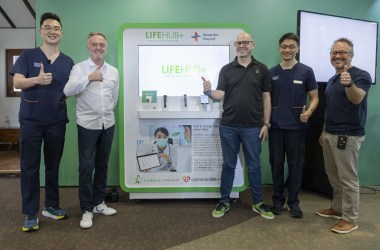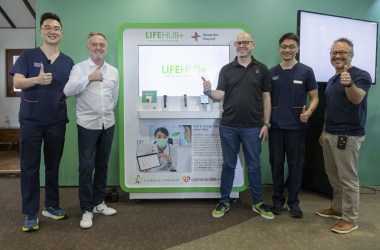StarHub’s LifeHub+ digital health service, developed in collaboration with Alexandra Hospital and ConnectedLife with Fitbit, marks a strategic step toward integrated, data-driven primary care. The offering aims to connect patients with a coordinated care team that includes a family doctor or GP, a trained health coach, and family caregivers, enabling proactive management of pre- and non-complex chronic conditions through a data-enabled, digitally mediated care pathway. The service is subscription-based, with a monthly fee of S$9.99 for the ConnectedCare plan under LifeHub+. An early adopter incentive provides the first 300 LifeHub+ subscribers—onboarded through partner GPs—with a Fitbit device and access to ConnectedCare at no cost for the initial 12 months. This approach is designed to accelerate patient engagement and enable real-time support from a multidisciplinary care team right from the outset.
LifeHub+ Launch and Partners: A New Model for Coordinated Digital Health
StarHub, with Alexandra Hospital and ConnectedLife powered by Fitbit, unveiled LifeHub+ as a pioneering digital health service designed to deliver personalised health and lifestyle insights while fostering a collaborative care ecosystem. The core promise of LifeHub+ is not simply data collection but the orchestration of care around consenting users’ health information. By integrating Fitbit-derived metrics into a centralized LifeHub+ dashboard, users gain access to dynamic health scores and real-time data alerts that translate raw numbers into actionable insights for day-to-day health improvements. This level of visibility is intended to empower patients to take meaningful steps toward healthier habits and to enable care teams to respond with timely guidance.
A distinctive feature of LifeHub+ is its digital care team model. The platform enables consent-based access for a patient’s pre-programmed care team, which can include the patient’s family doctor or GP, a health coach from Alexandra Hospital, caregivers, and even healthcare professionals from other institutions. This arrangement is designed to ensure a cohesive, multi-faceted approach to health management, leveraging the strengths of primary care, specialised coaching, and home-based support. The system’s architecture supports secure data sharing through a dedicated LifeHub+ dashboard, allowing clinicians and coaches to view pertinent health information and to coordinate interventions without the need for repetitive handoffs or fragmented communications.
The initial rollout centers on Alexandra Hospital as the onboarding hub, with a plan to connect GPs across the western region. Early interest from more than 30 GPs underscores a strong demand within the local primary care network for a structured digital health program that can augment routine care with data-driven insights and proactive interventions. AH’s role extends beyond clinical care; it includes the deployment of trained health coaches who can translate health data into personalised lifestyle recommendations.
From a broader perspective, LifeHub+ represents a strategic alignment with StarHub’s DARE+ initiative, which emphasizes connectivity and technology-enabled care. By bridging hospitals, family doctors, health coaches, and caregivers within a single digital framework, LifeHub+ aims to deliver an integrated, proactive care experience that can scale across Singapore’s healthcare landscape. The program’s emphasis on consent-based data sharing, dynamic wellness insights, and targeted nudges reflects a new era in which patients can partner with their care teams to manage health risks and prevent deterioration before it occurs.
In this model, the hospital’s clinical leadership, including AH’s Clinical Director and other senior physicians, plays a pivotal role in design and implementation. They see LifeHub+ as a sandbox for testing and scaling digital health innovations, particularly wearables-based data, which can enrich clinical decision-making and enable more precise, timely interventions. The collaboration is framed as a holistic approach to care that extends beyond hospital walls into the community, with the shared goal of improving patient outcomes while making the patient experience more seamless and empowering.
To summarize the launch and partnership narrative: LifeHub+ is a scalable digital health service that leverages Fitbit data under a consent-based framework to create a real-time, integrated care experience. It connects patients to a care team comprising family doctors, AH health coaches, caregivers, and potentially other healthcare professionals, all accessible through a secure LifeHub+ dashboard. The first onboarding wave focuses on AH’s locale, with a broader GP engagement plan to extend the program’s reach and deepen the integration of hospital-based expertise with primary care and community health support.
Features, Data Ecosystem, and Patient Engagement: Turning Data into Contextual Care
LifeHub+ introduces a comprehensive data ecosystem that blends wearable-derived metrics with clinician-driven insights and patient-reported information. Users can opt to share Fitbit data through the LifeHub+ app, enabling the generation of dynamic wellness scores that condense complex data streams into intuitive indicators of overall health and daily lifestyle patterns. The wellness score methodology is designed to distill meaningful trends from various metrics, including physical activity, sleep, heart rate, and other physiologic signals, along with user-recorded health measurements such as blood pressure and blood glucose obtained from third-party devices.
The platform’s data architecture supports a multi-faceted approach to health monitoring. The LifeHub+ dashboard serves as a central access point for patients, family doctors, AH health coaches, caregivers, and authorized clinicians from other healthcare institutions. This design recognizes that chronic disease risk and early signals of clinical deterioration are best managed through a collaborative, cross-disciplinary lens. Clinicians and coaches can interpret real-world data within the context of each patient’s health history, lifestyle, and goals. They can then tailor interventions that align with a patient’s readiness, preferences, and care plan.
A key feature of LifeHub+ is the system’s proactive nudging capability. The platform can be programmed to prompt changes that reduce sedentary behavior, encourage regular physical activity, and reinforce adherence to treatment regimens. Nudges can be tailored to the individual, supporting adjustments in daily routines rather than relying solely on episodic clinical visits. In parallel, LifeHub+ includes reminders for medications, exercise sessions, and scheduled medical check-ups, all designed to promote consistency in self-management and early engagement with care teams when risk signals emerge.
The ecosystem is designed to accommodate future enhancements, too. ConnectedLife’s roadmap envisions the integration of lifestyle questionnaires and disease risk assessment tools within LifeHub+. These tools would enable clinicians to capture a broader spectrum of risk factors and to quantify how lifestyle changes influence disease trajectories over time. The platform’s design also facilitates the secure exchange of health data with family doctors, clinics, and hospitals according to patient consent, thereby enabling a more unified approach to risk stratification, early intervention, and shared decision-making.
From the patient perspective, the appeal of LifeHub+ lies in its ability to convert continuous streams of wearable data into actionable insights that support healthier behaviors and better clinical outcomes. The technology is not a substitute for clinical judgment but a powerful ally that informs conversations between patients and their care teams, enabling more precise monitoring of simple chronic conditions such as obesity, diabetes, hypertension, and high cholesterol. For clinicians, the value lies in having a richer information base that can reveal subtle changes in health status sooner, opening opportunities for timely lifestyle interventions and medication adjustments before problems escalate.
In terms of data sharing and consent, LifeHub+ is designed to respect patient autonomy. Users choose what data to share and with whom, and they can revoke or modify their consents as circumstances evolve. The control remains with the patient, but the platform’s architecture ensures that the consenting care team can access relevant data when appropriate, facilitating coordinated care. This emphasis on consent, security, and patient empowerment is central to LifeHub+’s clinical promise and its appeal to both patients and healthcare providers who seek to harness digital health to improve outcomes.
The data sharing framework also supports performance hygiene for the care teams involved. Healthcare providers can observe trends across a patient cohort, enabling them to identify common risk factors, prioritize interventions, and refine care pathways over time. This data-enabled approach is intended to support evidence-informed decision-making while maintaining individual privacy and patient control over information flow. The end result is a more transparent, accountable, and collaborative model of care that aligns with contemporary expectations for digital health ecosystems.
Security and privacy considerations are integral to the platform’s design. ConnectedLife brings its compliance and governance background to the partnership, including accreditations and regulatory alignments that underpin trust in data handling. The collaboration positions LifeHub+ as a robust, privacy-conscious solution capable of supporting sensitive health information in a secure digital environment. The combination of consent-based data sharing, secure dashboards, and clinician-controlled access is intended to deliver a responsible, interoperable, and patient-centric health management experience.
In practice, the data ecosystem supports care delivery across several use cases. For pre- and non-complex chronic conditions, clinicians can monitor health indicators, trigger early interventions, and adjust lifestyle recommendations based on real-time observations. For patients at risk of deterioration, the platform provides structured, proactive care pathways that combine medical oversight with lifestyle coaching and caregiver support. The goal is to create a holistic health program that emphasizes prevention and early management, rather than reactive treatment only when problems become acute. Through this approach, LifeHub+ seeks to reduce adverse events, improve adherence to care plans, and foster healthier daily habits that translate into long-term health benefits.
Finally, the platform’s emphasis on hospital-to-community continuity of care reflects a broader trend in Singapore’s healthcare strategy: bridging acute care with primary care and home-based support to optimize outcomes and resource utilization. By connecting Alexandra Hospital’s expertise with community-based coaching and GP oversight, LifeHub+ aims to create a seamless, end-to-end care experience where information flows securely and meaningfully between hospital, clinic, and home.
Access, Pricing, and Onboarding: A Clear Path to Participation
LifeHub+ operates as a scalable digital health service with a subscription model for patients. The core plan, ConnectedCare, is offered through healthcare providers at a monthly rate of S$9.99. This pricing structure positions LifeHub+ as an affordable option for patients seeking structured digital health support and a coordinated care experience that integrates wearables data, clinical oversight, and lifestyle coaching.
An important introductory incentive targets early adoption. The first 300 LifeHub+ subscribers onboarded through partner GPs are eligible for a special benefit: a Fitbit device, plus access to ConnectedCare at no cost for the initial 12 months. This offer is designed to accelerate enrollment and ensure that new users can begin benefiting from continuous data collection and real-time care team access from the outset. The inclusion of a Fitbit device helps standardise data collection across participants, which in turn enhances the quality of insights available to clinicians and coaches.
The onboarding process emphasizes collaboration among patients, GPs, AH health coaches, and the care team. By leveraging AH’s network of over 30 GPs who have expressed interest, LifeHub+ can rapidly scale its reach while maintaining a high standard of clinical governance. The program’s design encourages patients to engage actively with their care teams, sharing consented data to support personalised health plans. AH’s metabolic clinic initiatives are part of this balanced approach, focusing on prevention and early disease management to reduce the likelihood of simple conditions progressing into complex chronic diseases.
Clinicians and healthcare providers who wish to participate in LifeHub+ or join as StarHub ConnectedCare partners can pursue enrollment through LifeHub’s partner channels. The partnership model is intended to be scalable, enabling additional hospitals, GP groups, and health systems to integrate with LifeHub+ over time. User engagement remains central to the program; patients are invited to contribute data, set health goals, and collaborate with coaches and clinicians to refine their personalised health plans. The combination of a straightforward pricing structure, early adopter incentives, and a robust network of care partners is designed to maximize uptake while maintaining a high level of clinical oversight and data integrity.
From a practical perspective, patients who enroll in ConnectedCare under LifeHub+ gain access to a comprehensive digital health toolkit. This toolkit includes the LifeHub+ dashboard for data sharing and insights, the Fitbit-enabled data stream for activity and wellness metrics, and the ability to receive personalised coaching and medical guidance from AH health coaches and GPs. The platform also enables reminders and nudges that support daily health behaviors, helping patients stay engaged with their plans and maintain momentum over time. For healthcare providers, the system offers a scalable, cloud-based solution that can be deployed across clinics and hospitals, with built-in privacy protections and consent management to ensure compliant data sharing aligned with patient preferences.
The onboarding narrative also emphasizes continuity of care and patient empowerment. By fostering closer ties between patients and their care team—especially with family doctors who function as the first line of care—the program aims to create a reliable, sustainable foundation for chronic disease prevention and management. This approach aligns with the broader objective of reducing hospital readmissions and enabling meaningful, proactive health improvements in the community.
In summary, LifeHub+ presents a clear, financially accessible pathway for individuals seeking integrated digital health support. The pricing, early adopter benefits, and strong network of hospital and GP partners create a compelling framework for patient participation. The onboarding process is designed to be patient-centric, clinician-guided, and scalable, with a focus on enabling users to engage with their care team through a secure, data-driven platform that supports healthier lifestyles and more proactive health management.
Governance, Privacy, and Clinical Integration: Building Trust in a Data-Driven Care Model
A central pillar of LifeHub+ is the robust governance and privacy framework that underpins data sharing, consent, and clinical integration. The system prioritizes patient autonomy, ensuring that users have clear control over which data are shared and with whom. The digital care team—comprising family doctors, AH health coaches, caregivers, and qualified clinicians from other institutions—depends on secure access to relevant health information, governed by patient consent. This architecture balances the benefits of cross-disciplinary collaboration with the imperative to protect personal health data and maintain patient trust.
ConnectedLife’s governance credentials contribute to LifeHub+’s privacy and security posture. The service is designed to comply with applicable data protection and privacy standards, with explicit alignment to recognized data protection frameworks that govern health information handling in multinational contexts. While particular regulatory labels (for example, PDPA, HIPAA, and GDPR) are cited to emphasize best-practice compliance across jurisdictions, the LifeHub+ implementation focuses on a Singapore-specific operating environment, incorporating local data protection requirements and hospital-based governance structures while drawing on Global data privacy principles where appropriate. This approach helps ensure that patient information remains secure, accessible to authorized care team members, and managed in a way that respects patient preferences and consent choices.
Clinical integration is supported by a carefully designed workflow that facilitates timely data review and decision-making. When a patient shares Fitbit and other health data, AH health coaches can monitor patterns, identify potential risk indicators, and coordinate with the patient’s GP to review treatment plans or modify lifestyle recommendations as needed. The dashboard’s real-time data presentation allows clinicians to see trends across time, supporting early intervention and more precise management of health risks. The care team can also tailor interventions so they align with each patient’s goals, preferences, and daily routines, which is essential for sustained engagement and meaningful outcomes.
The program’s privacy and security framework extends to data access controls, audit trails, and rigorous data governance policies. Access to sensitive health information is restricted to authorized users only, and activities within the platform are logged to ensure accountability and traceability. Consent management mechanisms enable patients to review and adjust their data-sharing preferences, providing ongoing visibility into who has access to their information and for what purposes. This design feature reinforces patient confidence that their health data are being used ethically and in a manner consistent with their stated goals.
From a clinical perspective, LifeHub+ is designed to support a spectrum of care scenarios. For patients at risk of developing chronic conditions or those with pre-existing but manageable conditions, the platform can facilitate proactive monitoring and timely lifestyle modifications, preventing escalation. For patients with simple chronic health needs, the integrated approach combines clinical oversight with personalised coaching and caregiver involvement, aiming to improve adherence and create a more stable health trajectory. The multi-layered governance model is intended to ensure that data-sharing arrangements remain transparent, reversible, and centered on patient welfare.
In addition to privacy and consent, LifeHub+ emphasizes cybersecurity measures to protect data integrity and availability. The collaboration with ConnectedLife and Fitbit includes security assessments and ongoing monitoring to detect and mitigate potential vulnerabilities. The objective is to create a secure environment in which patients can engage with their health data and care teams with confidence, knowing that privacy protections and security controls are in place to safeguard sensitive information.
Ultimately, LifeHub+ seeks to harmonize the needs of patients, clinicians, caregivers, and hospitals within a single, secure digital ecosystem. The governance and privacy framework is designed to support a broad, scalable model of care that respects patient autonomy, maintains data security, and enables effective clinical collaboration. By establishing trust as a foundational principle, the program aims to deliver sustained value for patients and care teams as it expands to additional regions and partners.
Implementation, Adoption, and Future Roadmap: Scaling a Digital Health Ecosystem
LifeHub+’s first deployment centers on Alexandra Hospital and its surrounding western region, where AH’s metabolic clinic patients and hospital-based care teams will actively participate in the program. The partnership is designed to broaden the hospital’s capability to deliver digital health interventions by leveraging wearables and data-driven insights to support primary care pathways. AH’s health coaches will deliver digital health interventions via the LifeHub+ app, crafting personalised health plans that incorporate lifestyle and dietary modifications. This integration of hospital expertise with digital health tools represents a forward-looking effort to extend hospital-grade care into patients’ daily lives, enabling timely lifestyle interventions and preventative care in the community setting.
The AH leadership team frames LifeHub+ as a strategic accelerator for integrated care. By connecting the hospital’s care teams with GPs who manage patient care in the community, the program seeks to strengthen the continuity of care. The hospital’s clinicians can intervene earlier by monitoring real-time data and adjusting care plans before conditions worsen. This approach supports a smoother transition from hospital-based care to home-based management and community support, potentially reducing complications and improving long-term health outcomes.
From a patient experience perspective, LifeHub+ offers a streamlined, user-friendly interface designed to offer straightforward health insights. The Fitbit metrics—such as steps, activity levels, sleep quality, and heart rate—are presented in an accessible format within the LifeHub+ app. Users can opt to share these metrics with their family doctor, health coach, and caregivers, enabling a collaborative approach to health management. The data-driven feedback loop fosters continuous improvement in daily habits, with clinicians able to identify patterns and provide timely guidance that supports healthier lifestyle choices.
Future features under development by ConnectedLife include expanded lifestyle questionnaires and disease risk assessment tools. These enhancements are expected to enrich the platform’s ability to quantify lifestyle-related risk factors and tailor preventive strategies accordingly. The ongoing product roadmap signals a commitment to deeper integration of lifestyle data with clinical decision-making, expanding the scope of LifeHub+ beyond tracking and reminders to more sophisticated risk stratification and personalized care planning.
In terms of adoption, the program has attracted significant interest from the local GP community, with more than 30 GPs expressing intent to participate through the Alexandra Hospital network. The onboarding strategy relies on establishing robust links between GPs, AH’s health coaches, and hospital clinicians to ensure that care is delivered in a coordinated, patient-centric manner. The collaboration aims to create stronger ties between patients and their care teams, particularly emphasizing the role of family doctors who serve as the first line of care and central coordinators for chronic disease management.
The program’s scaling potential rests on several factors: expanding AH’s metabolic clinic footprint to include more patients, recruiting additional GP partners across the western region, and continuing collaboration with ConnectedLife and Fitbit to extend data-sharing capabilities, analytics, and clinical decision support. The plan envisions broader deployment across Singapore, with iterations designed to accommodate regional variations in healthcare delivery and regulatory requirements. The goal is to build a sustainable, scalable digital health ecosystem that can support a wide range of chronic disease management needs while maintaining high standards for privacy, security, and clinical quality.
From a clinical leadership perspective, leaders emphasize that LifeHub+ is not merely a technology deployment but a transformation of care pathways. The platform’s ability to bring together hospital-based clinicians, community health coaches, and primary care physicians through a shared data-enabled framework is viewed as a model for future digital health initiatives. Clinicians argue that wearables and digital health data can provide valuable context about a patient’s daily life, enabling more proactive and personalised interventions that complement conventional care. This integrated approach is expected to deliver better health outcomes by emphasizing prevention, timely care, and patient empowerment.
In summary, LifeHub+ is designed to be scalable, patient-centered, and clinically meaningful. Its implementation in partnership with Alexandra Hospital and ConnectedLife with Fitbit creates a blueprint for how digital health services can bridge hospital care, primary care, and community support. The program’s ongoing evolution—driven by clinical feedback, patient experiences, and technological advances—aims to deliver enhanced health outcomes, higher patient engagement, and a more proactive approach to managing chronic conditions in Singapore.
Conclusion
LifeHub+ represents a forward-thinking convergence of wearable technology, hospital-based care expertise, and primary care coordination, anchored by a clear subscription model and a patient-centric data-sharing framework. By linking patients with a family doctor or GP, AH health coaches, and caregivers within a single secure platform, the service seeks to empower individuals to manage pre- and non-complex chronic conditions more effectively. The initial onboarding with Alexandra Hospital and the engagement of more than 30 GPs signal strong interest in this new model of care, while the early adopter incentive—providing Fitbit devices and free ConnectedCare access for 12 months for the first 300 subscribers—demonstrates a pragmatic approach to accelerating adoption.
The LifeHub+ ecosystem integrates Fitbit-derived health metrics with dynamic wellness scores, data alerts, and personalised coaching, enabling coordinated action across hospital, clinic, and home. Its emphasis on consent-based data sharing, privacy protections, and a secure dashboard aligns with contemporary expectations for responsible digital health solutions while supporting proactive, lifestyle-focused care. The platform’s nudges and reminders aim to sustain engagement and promote healthier daily routines, potentially reducing risk factors associated with obesity, diabetes, hypertension, and hyperlipidemia.
Looking ahead, ConnectedLife’s roadmap—encompassing additional lifestyle questionnaires, risk assessment tools, and deeper integrations—holds promise for expanding the program’s capabilities and impact. As LifeHub+ scales, the partnership framework with AH and GP networks, augmented by the Fitbit data ecosystem, could redefine how Singapore delivers preventive care and chronic disease management. The overarching objective is to foster stronger patient-care team connections, improve health outcomes, and deliver a more seamless, integrated care experience that traverses hospital care, community health coaching, and ongoing primary care management.



